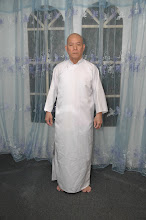Singapore time 9.13 am 14th September 2007
Zhongyong
compile on 18th December 2006 from posts in Google.com group soc.culture.singapore plus others Posts
What Heaven has conferred is called The Nature; an accordance with this nature is called The Path of duty; the regulation of this path is called Instruction.
[What which is Destiny is called self-nature or characteristics. That which leads Destiny is called Tao. Cultivating Tao is called religion.]
[Our life is fated or destined under the influences of stars, sun and moon etc. So we are acting according to all these influences. The One leading or a step above the Destiny is called Tao. Tao controls our fate. The teaching of cultivation and action in cultivation is called religion. Therefore Confucianism is a religion. Chinese regard Confucianism as a philosophy or teaching, this is wrong. Teaching of moral conduct is religion.]
The path may not be left for an instant. If it could be left, it would not be the path. On this account, the superior man does not wait till he sees things, to be cautious, nor till he hears things, to be apprehensive.
[The Tao cannot be left for an instant. Can leave IT is not Tao. Therefore the gentleman abstains from longing what he does not see, abstains fears which he has not heard.]
[Tao cannot be left means IT is a part of us and cannot be separated. If we look for Tao outside our body, that is not Tao. So one has to abstain from desires and unnecessary fears.]
There is nothing more visible than what is secret, and nothing more manifest than what is minute. Therefore the superior man is watchful over himself, when he is alone.
[Cannot see what is not clear or visible. Cannot visualise what is minute. Therefore the gentleman is careful when he is alone.]
[Tao cannot be seen because IT is too minute or Void. So the sage is careful of his conduct even when alone without the scrutiny of other people.]
While there are no stirrings of pleasure, anger, sorrow, or joy, the mind may be said to be in the state of Equilibrium. When those feelings have been stirred, and they act in their due degree, there ensues what may be called the state of Harmony. This Equilibrium is the great root from which grow all the human acting in the world, and this Harmony is the universal path which they all should pursue. Let the states of equilibrium and harmony exist in perfection, and a happy order will prevail throughout heaven and earth, and all things will be nourished and flourish.
[Pleasure, anger, sorrow and joy, when they are not in our mind or developed in our mind, our state of mind, this is called Central. When those feelings have been stirred, but our mind is neutral, this state is called Harmony. Central is the root or base of the whole universe. Harmony is reaching Tao in this world. Perfecting Central and Harmony, this is the site of heaven and earth. All things will benefit from this.]
[Pleasure, anger, sorrow and joy are feeling of common people in everyday life. The sage cannot be like them. So he has to keep his mind in neutral stage of mind and be impartial to what is right and wrong, good nor evil, long nor short, front nor back etc. When he is able to perfect himself in this state of mind, he is in trinity with heaven and earth, him as the people, ren. This trinity will evoke the base of the universe and all things will benefit from him alone. He is able to influence all things on earth.]
The first part of Zhongyong. Another translation is from copy text, blue is from Legge and red is my comment, and brown is my translation.
Friday, 14 September 2007
Subscribe to:
Post Comments (Atom)

No comments:
Post a Comment